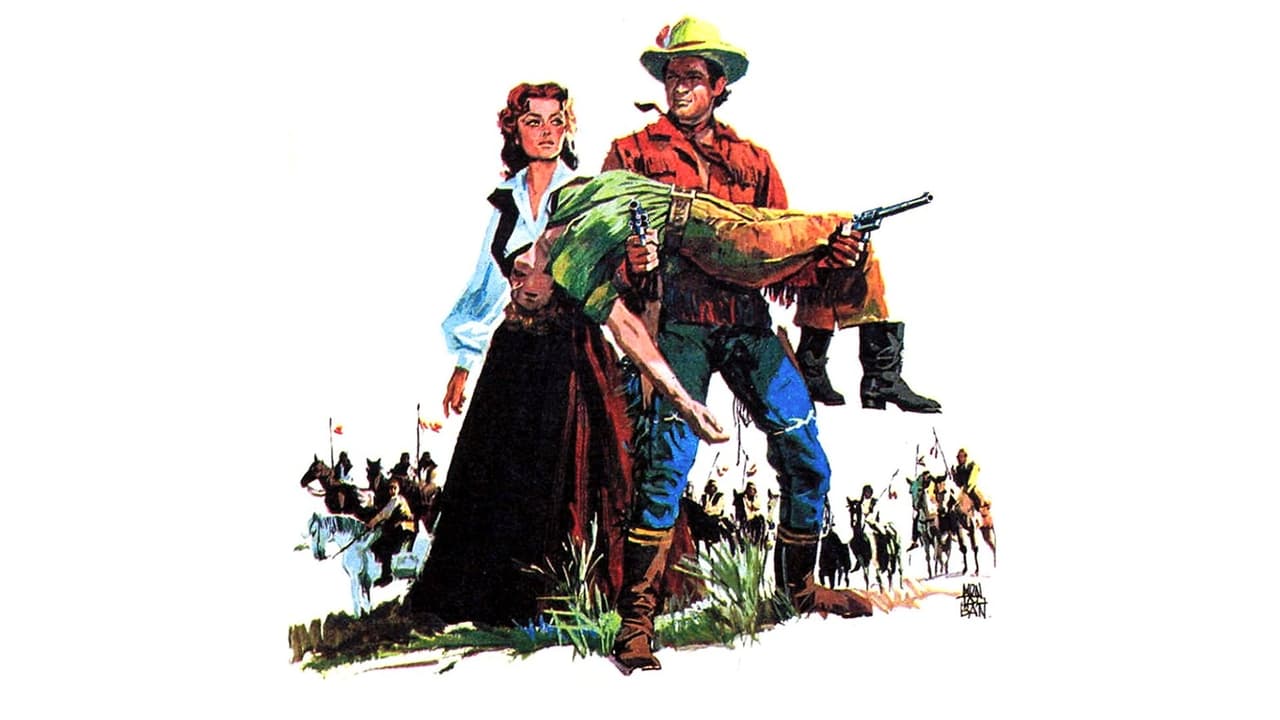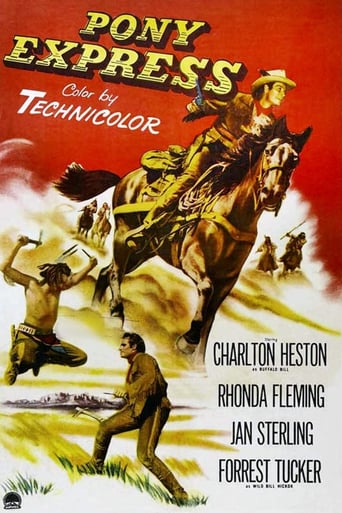

the audience applauded
... View MoreAdmirable film.
... View MoreThrough painfully honest and emotional moments, the movie becomes irresistibly relatable
... View MoreThe film may be flawed, but its message is not.
... View MoreA spectacular and mighty adventure in the early 1860s when America's destiny rode in the saddle bags of the Pony Express . As the Pony Express was a mail service delivering messages , newspapers , mail, and small packages from St. Joseph, Missouri, across the Great Plains, over the Rocky Mountains and the Sierra Nevada to Sacramento, California, by horseback, using a series of relay stations . During its 19 months of operation, it reduced the time for messages to travel between the Atlantic and Pacific coasts to about 10 days . When replaced by the telegraph, the Pony Express quickly became romanticized and became part of the lore of the American West . Its reliance on the ability and endurance of individual young, hardy riders and fast horses was seen as evidence of rugged American individualism of the Frontier times . Pony Express logo was used by stagecoach and freight company Wells Fargo, which provided secure mail service . Buffalo Bill (Charlton Heston) and Wild Bill Hickock (Forrest Tucker) work to establish the short-lived Pony Express and fight Indians along with stagecoach station owners and California Separatists who seek to destroy it . Meanwhile , they fall in love for two beautiful damsels , Evelyn Hastings (Rhonda Fleming) and Denny Russell (Jan Sterling) , Calamity Jane lookalike role .This traditional Western of the founding of mail routes westward contains thrills , rousing nice action , shootouts , Sioux Indian attacks and exuberant outdoors . Dealing with the glamorous Pony Express mail route between Saint Joseph , Missouri, and Sacramento , California during ten days , in which brave riders battling hostile Indians , cutthroats attempting on robbing , bad weather , astute bandits and many other things . As Pony Express became from April 3, 1860, to October 1861, the West's most direct means of east–west communication before the telegraph was established and was vital for tying the new state of California with the rest of the United States . The main protagonists result to be two Western legends , both of them historical figures , Buffalo Bill and Wild Bill Hickock , and it doesn't check every fact . Although , the real Buffalo Bill , William F. Cody, and Wild Bill Hickock claimed to have won their spurs as young Pony Express riders, there is no evidence that they ever worked for the company ; in fact , concerning great adventures , bigger than they were in life , as the real Buffalo Bill was only 14 when the Pony Express was established . The film displays a colorful cinematography by veteran cameraman Ray Rennahan . In addition , thrilling and evocative musical score by Paul Sawtell. The motion picture produced by Nat Holt was decently directed by Jerry Hopper , but with no enthusiasm . Hopper firstly worked for Paramount , them he crossed to Universal and immediately proved himself on more intimate subjects , particularly those with veins of comedy or sentiment . Hopper directed all kind of genres such as Western : ¨Madron¨, ¨The Bull of the West¨ ; gritty Thriller : ¨Naked alibi¨ , ¨The Atomic City¨ , ¨The square jungle¨ ; Comedy : ¨The private war of Major Benson¨with Charlton Heston ; Adventures : ¨Alaska seas¨ , ¨The Sharkfighters¨ , ¨The secret of Incas¨ and ¨The Missouri traveler¨, it was the best of Hopper's later movies before he became entrenched in television . As Jerry Hooper also filmed a great quantity of TV episodes such as ¨Voyage to the bottom of the sea¨ , ¨The fugitive¨ , ¨Perry Mason¨ , ¨Shenandoah¨ , ¨Adams family¨ , ¨Caravan¨ and ¨Gunsmoke¨.
... View MoreFairly ordinary 1860s Western tells a fictional account of how the Pony Express Mail Delivery System was founded, helped along by Buffalo Bill Cody (Charlton Heston) and Wild Bill Hickok (Forrest Tucker). A young Heston's determined and self-assured characterization makes for some enjoyment early on in the picture, though the second half becomes somewhat routine with typical "Cowboys and Indians" confrontations. Forrest Tucker doesn't invest as much in his Hickok personage. The leading women are Rhonda Fleming and Jan Sterling, both of whom are rivals who are sweet on Buffalo Bill. Sterling's is the more engaging of the two, and we can't help but feel sorry for her as the young tomboy whose infatuation for Heston goes unrequited. ** out of ****
... View MoreThis film may feature some real characters they weren't involved in the founding of the real Pony Express... still as a work of fiction it is entertaining enough. The film opens with 'Buffalo' Bill Cody left stranded in the middle of the prairie after his horse is killed in an Indian attack. Luckily for him the stage coach passes by not long afterwards and he gets on board. There are two people inside already; Evelyn Hastings and her brother Rance. They haven't been travelling long when they meet what appears to be a group of soldiers; they claim that they have been sent to arrest the Hastings for treason but Bill realises that they aren't who they claim to be. The Hastings do however wish for California to break away from the United States as they believe their state is too distant from the rest of the country to be cared about. Bill, and his friend 'Wild' Bill Hickok, however are doing something about bringing it closer to the rest of the Union... not in distance but in the time it takes news to get through. They are working on setting up a string of relay stations across the country so that news may be passed from rider to rider rather than relying on the slow stage coach. Rance Hastings and his collaborators are determined to prevent the express running, and to make matters worse a local Indian chief is determined to kill Cody. Not surprisingly there is also a romantic subplot; tomboy Denny Russell is clearly in love with Cody but gets jealous when he appears to be more interested in Evelyn.Charlton Heston was not yet a major star when this was made although he is clearly the star of the film; he puts in a solid performance... although I don't know how somebody in 1860 could have a smile like that; he looked like he was in a toothpaste commercial with his brilliant white teeth! Rhonda Fleming, playing Evelyn, was clearly meant to be the leading lady however she was upstaged by the short-haired Jan Stirling who played the feisty Denny. There was a good amount of action spread throughout the film including plenty of gunfights, a fight between Cody and an Indian chief using tomahawks and even an explosion. The story is fairly standard with separatists and Indians clearly meant to be viewed as the bad guys, although the latter are at least bad guys with honour; while those wishing to do their bit to preserve the Union being obvious heroes; the final shoot out did feature one surprise but I won't spoil that here. At a hundred and one minutes it is clearly too long for a B-western however it does have a B-western feel to it; it might be best looked at that way as it passes the time well enough but it will never be a classic of the genre.
... View MoreDirected by Jerry Hopper and starring Charlton Heston, Forrest Tucker and Rhonda Fleming, Pony Express is adapted from a story written by Frank Gruber. It revolves around the birth of the Pony Express and how it linked California to the rest of the United States, thus preventing it from becoming a separate republic. Buffalo Bill Cody (Heston) and Wild Bill Hickok (Tucker) are the principal characters in the formation of the St Joseph-Sacramento speed run that has long since passed into folklore. Very much a fictionalised account of the "Express" and its principals, this tale deals in an attempt to form a separatist movement from the Union and the trials and tribulations that Cody & Hickok go thru in order to successfully launch the "Express". Cue Indian attacks, with the Indians being armed by corrupt business men, and sinister plotting by the seemingly affable Hastings siblings (Michael Moore & Fleming). A loose remake of the 1924/25 silent film of the same name, Hopper's movie suffers from being overlong and for spending too much time with the Hastings sub-plot. It's only when we get to the last quarter that the film gathers apace, until then we are left with only Heston's gusto and Fleming's sexuality to hold our attention. Director Hopper struggles to craft any energy from the number of dialogue driven set-ups, and even a Mano-Mano fight to the death between Cody and Yellow Hand (Pat Hogan) is undeniably flat. Thank god then for Heston giving it brio. A few years away from career defining roles, he seems to be enjoying himself and puts ebullient life into the film when it starts to sag. Fleming too is a highpoint. When not asked to lead off awful films like Bullwhip, Fleming was a more than capable actress, helped enormously by her sexiness and ability to own her scenes. She raises temperatures here considerably with one particular scene as both Jan Sterling (as Tomboy Denny) and herself each take a bath. Thankfully the finale doesn't follow suit with what has gone before it, with Hopper gaining a little redemption with this action quarter. The momentum is built up as we approach the first "Express" run, a gunfight is well staged and the shots of the horses bolting along the plains are a joy; in particular one shot as man and beast speed off under a blood red sky (well done cinematographer Ray Rennahan). Then it's the inevitable showdown where Heston flexes his gun toting muscles and a surprise development earns the picture an extra plaudit. So a real mixed bag for sure then. Well worth a watch for Heston purists and Fleming lusters. And indeed for Western fans who are versed in the lower grade genre entries so prominent in the 1950s. But it clearly doesn't fulfil its potential and the snippets of good only further make one feel a touch annoyed once the end credit booms out from the screen. 5.5/10
... View More